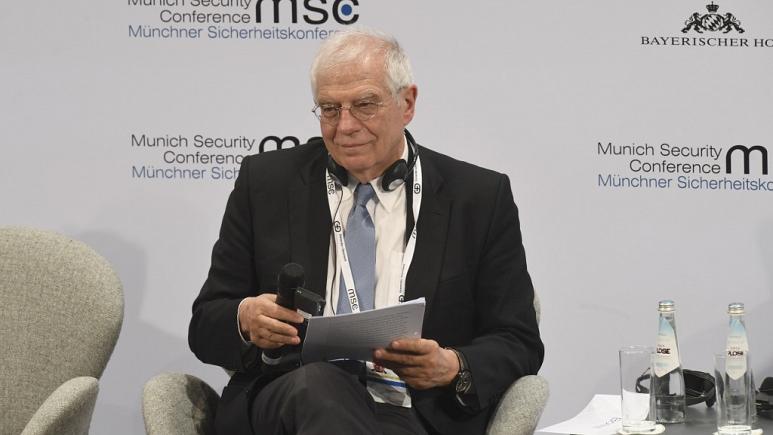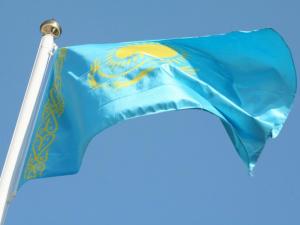
EuroNews (17 February 2020)
Christof STACHE / AFP
The European Union must develop an "appetite for power" and must be more willing to intervene in global crises, the bloc’s chief diplomat said at the Munich Security Conference on Sunday.
"We should be able to act, not everyday making comments or expressing concern," EU foreign policy chief Josep Borrell told the audience.
"I think we are going too slow. We are not doing enough and the world is changing very quickly. Our security and defense policy is not in accordance with the big changes in the world."
He added: "If a big crisis comes, we will not be prepared to face it."
European states should be willing to intervene in global crises, Borrell said, otherwise their foreign policy risks political paralysis. "Europe has to develop an appetite for power."
Borrell said he requires a "deeper, better construction" for the EU's security policy, stressing that it isn't only the European Commission, but "the EU as a whole" that must "learn to use the language of power".
"If we are not able to take decisions that constraint others, we don't have power. Influence, but not power", he said.
Borrell also discussed the EU's principle of unanimity, in which all countries must vote for a proposal for it to be validated.
Taking the example of a naval mission in Libya that would be supported by 26 out of the 27 member states, he said: "Then what do we have to do? (...) We cannot be attached to unanimity in extreme cases like this one."
The European Union's consensus requirement indeed complicates things. Many EU states are divided on geopolitical issues, from the Venezuelan to the Libyan crisis.
"When there is no unanimity, the remaining majority have to act," Borrell said.
No comments yet.
- HOW KING LEOPOLD II OF BELGIUM KILLED 10 MILLION AFRICANS IN THE CONGO – READ THE HARROWING DETAILS Europe - EU 17.02.2020
- HEAD OF AZERBAIJANI COMMUNITY OF NAGORNO-KARABAKH REGION OF AZERBAIJAN MEETS WITH PERSONAL REPRESENTATIVE OF OSCE CHAIRPERSON-IN-OFFICE The Caucasus and Turkish-Armenian Relations 17.02.2020
- NGO: ARMENIAN JOURNALISTS UNDER 'GROWING HARASSMENT' The Caucasus and Turkish-Armenian Relations 17.02.2020
-
 KAZAKHSTAN CONSIDERS INTRODUCTION OF OECD STANDARDS TO BE OF GREAT IMPORTANCE
Central Asia
17.02.2020
KAZAKHSTAN CONSIDERS INTRODUCTION OF OECD STANDARDS TO BE OF GREAT IMPORTANCE
Central Asia
17.02.2020
- POLITICAL CHAOS IN ARMENIA – REALITIES THAT HYPOCRITES DO NOT WANT TO SEE The Caucasus and Turkish-Armenian Relations 17.02.2020
-
25.01.2016
THE ARMENIAN QUESTION - BASIC KNOWLEDGE AND DOCUMENTATION -
12.06.2024
THE TRUTH WILL OUT -
27.03.2023
RADİKAL ERMENİ UNSURLARCA GERÇEKLEŞTİRİLEN MEZALİMLER VE VANDALİZM -
17.03.2023
PATRIOTISM PERVERTED -
23.02.2023
MEN ARE LIKE THAT -
03.02.2023
BAKÜ-TİFLİS-CEYHAN BORU HATTININ YAŞANAN TARİHİ -
16.12.2022
INTERNATIONAL SCHOLARS ON THE EVENTS OF 1915 -
07.12.2022
FAKE PHOTOS AND THE ARMENIAN PROPAGANDA -
07.12.2022
ERMENİ PROPAGANDASI VE SAHTE RESİMLER -
01.01.2022
A Letter From Japan - Strategically Mum: The Silence of the Armenians -
01.01.2022
Japonya'dan Bir Mektup - Stratejik Suskunluk: Ermenilerin Sessizliği -
03.06.2020
Anastas Mikoyan: Confessions of an Armenian Bolshevik -
08.04.2020
Sovyet Sonrası Ukrayna’da Devlet, Toplum ve Siyaset - Değişen Dinamikler, Dönüşen Kimlikler -
12.06.2018
Ermeni Sorunuyla İlgili İngiliz Belgeleri (1912-1923) - British Documents on Armenian Question (1912-1923) -
02.12.2016
Turkish-Russian Academics: A Historical Study on the Caucasus -
01.07.2016
Gürcistan'daki Müslüman Topluluklar: Azınlık Hakları, Kimlik, Siyaset -
10.03.2016
Armenian Diaspora: Diaspora, State and the Imagination of the Republic of Armenia -
24.01.2016
ERMENİ SORUNU - TEMEL BİLGİ VE BELGELER (2. BASKI)
-
AVİM Conference Hall 24.01.2023
CONFERENCE TITLED “HUNGARY’S PERSPECTIVES ON THE TURKIC WORLD"









